Atlantic Monthly Contributors's Blog, page 424
June 1, 2015
The (Only) Good Thing About Another Fifty Shades of Grey Sequel

If you’re looking for proof that the line between pleasure and pain can be a thin one, here is some additional evidence: There’s going to be another Fifty Shades of Grey book. It will be titled, simply, Grey, and it will be published in paperback and as an eBook by Vintage Books later this month. E.L. James, author of the Fifty Shades trilogy, broke the news of Grey’s imminent release on social media Monday morning. As she did so, she made clear to note that the book will be told from the point of view of the series’ protagonist—who is also, of course, the guy who has also doubled as the series’ villain: Christian Grey.
“Christian is a complex character, and readers have always been fascinated by his desires and motivations and his troubled past,” James explained. She added: “This book is dedicated to those readers who asked … and asked ... and asked ... and asked for this.”
Related Story
The book will be released on June 18. Which is, the press release is happy to point out, Christian Grey's birthday.
If that all seems pretty craven, that's because it is. Grey, on the one hand, represents the reboot industrial complex at its logical extreme: Fifty Shades of Grey was inspired by a hugely successful book that begat more hugely successful books that begat a hugely successful movie that begat more hugely successful movies. ("Successful," to be clear, in the purely financial sense of the word.) Fifty Shades itself was a hugely successful book that begat another hugely successful book that begat another hugely successful book, and those, in turn, begat a hugely successful movie that will, in 2017, begat what will likely be another hugely successful movie. That the corporations behind these behemoths, among them Penguin Random House, owner of Vintage Books, and Universal Pictures, would want more stories to publicize and franchise and otherwise monetize is entirely unsurprising.
There is, instead, a capitalistic inevitability to this whole endeavor. The companies are doing what they do so well: capitalizing, in every sense of the word.
There is, however, one good thing—one non-craven thing—about the news of an addition to the Fifty Shades franchise. It has to do with the particular kind of sequel that Grey promises to be. It’s significant that Grey’s story will be told from Christian's point of view—the point of view, in other words, of the villain.
These stories insist on badness—evil, cruelty, criminality—not just as a sui generis situation, but as something that is systematized.That narrative approach puts Grey in league with many other recent reboots and sequels and franchise-extenders, whether they’re of fairy tales or comic books or stories that are purposely banal in their subject matter. Wicked. The latest Cinderella. Maleficent. Mirror Mirror. Shrek. Confessions of an Ugly Stepsister. Wide Sargasso Sea. Breaking Bad. The Wire. The Sopranos. Orange Is the New Black. Etc. These are premised not just on the idea that villains and anti-heroes are often more interesting than their protagonistic counterparts, but also on the notion that there is literary value in empathy. These stories insist on badness—evil, cruelty, criminality, whatever form it may seem to take—not just as a sui generis situation, but as something that is systematized. And, thus, the effect of a series of causes. There’s a reason Walter White behaves the way he does. Just as there’s a reason Cinderella’s stepmother is so terrible to her young charge. Those reasons can be compelling, and revealing. As i09 put it, “A villain is just a hero who needs to get a better PR department.”
So what Grey represents, besides capitalism at work, is also something slightly more optimistic: It is capitalism that is capitalizing on empathy itself. Capitalism that has decided to care what someone like Christian Grey thinks about the world, and that assumes that readers will care, too. Why does Grey do what he does? Why does he take pleasure in others’ pain? We are, apparently, about to find out. “As anyone who has ever been in a relationship knows,” James put it, “there are two sides to every story.”









The Passion of Brad Bird

Brad Bird has been one of Disney’s best regarded directors of family-friendly films for more than a decade. His Pixar efforts The Incredibles and Ratatouille were critically acclaimed hits, and while his new live-action epic Tomorrowland has underperformed at the box office, it’s that rare blockbuster aimed at a PG-rated audience. Yet the artist he most consistently draws comparison to is one less associated with epicurean, anthropomorphized rats and more with the muscular endorsement of selfishness and unfettered ambition. In short, Internet theorists believe Bird’s oeuvre is a thinly veiled homage to Ayn Rand.
Critics have long made the connection between Bird and objectivism—the philosophy of rational self-interest espoused by Rand—because of the messages of individuality in his animated films. Then Tomorrowland came out and made it even easier to make the connection. The George Clooney-starring action adventure is overstuffed with plot, backstory, and visual flights of fancy, but its underlying story feels superficially similar to Rand's masterpiece Atlas Shrugged, beloved by many American conservatives and libertarians.
Related Story
In Tomorrowland, the End of the World Is Disneyfied
In Tomorrowland, the world's most innovative thinkers, artists, and scientists discover another dimension where they can build a utopia free of society's ills; eventually, convinced that humanity's downfall was imminent, they retreat there permanently, turning it into a veritable Galt's Gulch—a secluded community of anti-government capitalists in Atlas Shrugged. Bird has repeatedly denied that there's any political dimension to his work, and there's no reason not to believe him—but it's also clear that his favorite subject matter is the raging passion of a creative genius being constrained. And that's where things get tricky.
This argument that Bird might hold Randian beliefs first emerged after the release of his second feature film, 2004's The Incredibles, a delightful Pixar romp about a family of superheroes who’ve been forced to suppress their identities by a government angry with their city-smashing derring-do. The patriarch, Mr. Incredible, grumbles that his son Dash, blessed with super-speed, has to cover up his abilities at school to avoid standing out; the villain of the film is a disgruntled inventor who resents superheroes for their natural gifts. The film's message seems pretty simple: embrace what's special about yourself (which, after all, is the message of almost every Disney film). But some saw it as a libertarian paean to the super-family, blessed with inherent gifts that should not be contained.
The reality is somewhere in the middle: Mr. Incredible complains about the meaningless celebration of mediocrity that happens at his son's school, where he's thrown a graduation ceremony for completing the second grade. Ayn Rand might agree, but so would most suburban dads in any hacky sitcom ranting about getting a trophy for participation—perhaps there's a little objectivism in every parent when it comes to their children. Mr. Incredible is stuck in a dull office job longing to return to his glory days. But that's just a standard-issue mid-life crisis, imagery Bird knowingly plays on—Mr. Incredible buys a sports car, starts lying about going on business trips, etc.
Mr. Incredible's story is one of creativity stifled, and it's a thread that crops up in a lot of Bird's films. In Ratatouille, Remy the rat is born with a sophisticated palette, and all he wants to do is cook gourmet food—but he’s held back by being a member of his species, which isn’t typically allowed anywhere near a gourmet kitchen. In Tomorrowland, Frank Walker (George Clooney) is invited to live among the world's smartest people, but is eventually exiled because he wants to share their discoveries with the rest of humanity.
In each film, there's an indelible recurring image: the frustrated genius, locked away in a dusty closet, obsessing over the talents he has to hide. For Mr. Incredible, it's his costumes and trophies; for Remy, his pots and pans, and for Frank, it's a ramshackle house stuffed to the gills with gadgets and gizmos, the most frightening of them all being some sort of doomsday machine that predicts the world's end will arrive in less than 60 days. Frank's machine is purportedly what kept Tomorrowland's villains (represented by a dour administrator played by Hugh Laurie) from interacting with the rest of Earth, so convinced they were of its impending end. But eventually it's discovered that prediction has kept everyone in a pessimistic feedback loop—and only optimism, the creative thirst for the new and the different, can truly save the world.
If it sounds like Tomorrowland's ultimate moral is delivered a little forcefully—it is. That’s likely another reason Bird is continually tagged as a political firebrand. He’s a master of weaving his characters' emotional journeys with staggering visuals, but his films are largely made for younger audiences, and their messages are delivered with little subtlety. In Tomorrowland, Laurie’s character decries Hollywood's obsession with dystopian storytelling. In Ratatouille, Remy is ultimately vindicated by a rave review from a usually grim critic: "Not everyone can be a great artist … But a great artist can come from anywhere."
In Bird’s films, there's a recurring image: the frustrated genius, locked away in a dusty closet, obsessing over the talents he has to hide.Bird's career trajectory plainly reflects that sentiment. Raised in Montana, he toured Walt Disney World at the age of 11 and proclaimed that he wanted to be an animator, returning two years later with his first completed work, which was enough to spur one of the company's legendary animators, Milt Kahl, to mentor him from a young age. He came up as a feature animator during the medium's greatest decline in the 1980s, where a string of flops prompted Disney to scale back the resources of its animation department. After spending years in television (mostly working on the early seasons of The Simpsons), Bird directed one of the greatest animated features ever made, 1999's The Iron Giant, another financial flop that Bird largely blamed on mishandled publicity from Warner Bros. Animation, which stopped making feature-length films shortly after.
It was only when Bird was brought into the Pixar fold that he experienced real box-office success, and (coincidentally or not) he will return to that territory after Tomorrowland's box-office underperformance to make The Incredibles 2, a surefire hit. But while The Incredibles had the advantage of Pixar's impeccable brand and an advertising-friendly story of family superheroes, Bird's creative instincts flow through every frame. The film's DVD release features a long documentary that details his demanding, often punishing, but highly successful creative approach. At one point in the documentary, a member of the crew sings a song about the "800-pound gorilla" bearing down on them all (Bird). In many other scenes, the director rants about the perceived second-class status of animated films, often treated with kid gloves by critics who refuse to acknowledge them as cinema.
As a director, Bird might have his quirks, but his works are less eccentric. Frank Walker and the heroes of Tomorrowland are seeking not to rule the world, as an objectivist might, but merely to have their voices heard as loudly as possible. When Bird won his second Academy Award (for Ratatouille as Best Animated Feature) his charming but impassioned speech said it all.
I also want to thank my junior high guidance counselor for a meeting we had where he asked me, “What do you want to do with your life?” And I said, “I want to make movies.” And he said, “What else do you want to do with your life?” And I said, “Make movies.” And he said, “What if you couldn't make movies?” And I said, “I'd have to find a way that I could.” “What if movies didn't exist?” “I'd have to invent them.”









Game of Thrones: The Only War That Matters
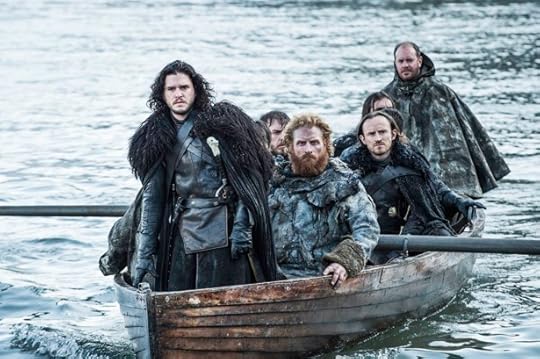
Spencer Kornhaber, Christopher Orr, and Amy Sullivan discuss the latest episode of Game of Thrones.
Sullivan: It’s going to be hard for me to type this, what with my hands still over my eyes, but I’ll try. Is it over yet? And by “it,” I mean, all of humanity?
There’s nothing like a horrifying White Walker infestation and bloodbath to put things in perspective. Cersei is rotting away, lapping up water from the floor of her cell, because she won’t confess and “kneel before some bare-footed commoner”? Confess and run for your life. The White Walkers are coming! (Also, you totally did all those things you’re accused of doing. Even Tommen probably realizes that by now.)
Arya’s busy with her new job, serving the Many-Faced God, which is basically serving death? You want death? The White Walkers fart in the general direction of the Many-Faced God!
I feel for you, Olly. The slaughter of your village and murder of your parents in front of your eyes was awful. Does Jon really need to join forces with the Wildlings responsible for those atrocities? [Fast-forward to last 10 minutes of the episode.] Yes. Yes, he absolutely does!
Stannis is marching on Winterfell and the Boltons are squabbling over the proper military response? Could not be less consequential. The White Walkers make Ramsay look like Ser Pounce!
Dany and Tyrion are acting out some fanfic, bonding over glasses of wine while complaining about their awful fathers and trading witticisms? Okay, that was pretty enjoyable. But still. Forget about the Iron Throne. Forget about the wheel. The White Walkers have a king!
The Magnar of Thenn wants to bicker about the Night’s Watch instead of getting his people on those boats for their only chance of survival? Well done. Now you’re part of the White Walker zombie army!
I still have shivers from that spooky closing sequence—the White Walker King striding out onto the dock as Tormund and Jon float away, raising his arms, and instantly turning the bodies of the slaughtered Free Folk (including Wildling chieftain Karsi, who seemed too promising a character to die so soon) into the newest members of the White Walker army. All in dead silence, which continued into the credit sequence.
We should talk about the rest of the episode, which was quite good, but I find myself in a bit of a Westerosi existential crisis. Unless Dany focuses her attention on developing space travel, burns Westeros to the ground, and sends everyone off to colonize—and fight over—another planet, what hope do any of our characters have? Jon Snow left behind the bag of dragonglass and while we learned that Valyrian steel does indeed kill White Walkers, Old Valyria is occupied by its own freaky zombies who aren’t exactly operating sword factories.
If these are the real stakes for the show, does that mean all of the other stories matter only insofar as they get in Dany’s way or help her? So I suppose I should be enjoying Cersei’s comeuppance—abandoned by her son and her uncle, with no one to visit but the weirdo Qyburn. But it’s a problem of her own making, and the fact that she still continues to sniff about “commoners” is absurd. And I am glad that Sansa finally knows her younger brothers are alive—or at least that they weren’t killed by Theon. We probably shouldn’t tell her that one of them is now north of the Wall and therefore future lunch for the White Walkers.That leaves us with Games of Thrones’ newest dynamic duo: Daenerys and Tyrion. The gods bless Peter Dinklage for finally injecting some life into the Meereen story. No disrespect to Ser Barristan, may he rest in peace, but it’s nice to see Dany with an advisor who might actually be useful. And it’s nice to see Tyrion raising the bar for his life goals to “advising a ruler worth the name” instead of drinking himself to death or wasting his sound judgment on the sociopathic spawn of his siblings.
Related Story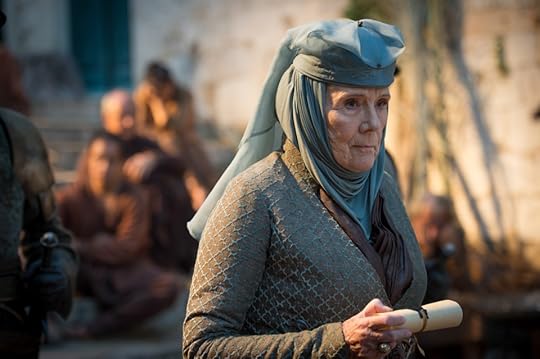
Game of Thrones: The Meeting Viewers Have Been Waiting for
But I still end up with this crisis, Chris and Spencer. The show is called Game of Thrones. We’ve followed nearly five seasons of political maneuvering and scheming, and we have this fascinating counterpoint across the Narrow Sea in a leader who wants to turn the whole game upside down by putting power in the hands of the people. And yet it is starting to look like the real reason Dany may matter is that the only known ways to destroy White Walkers all have some connection to House Targaryen.
I’m as interested as anyone in learning more about the magical origins of Valyrian steel and dragonglass from Dragonstone—both ancestral seats of House Targaryen. And I can only assume that actual dragons have some role to play in the coming battle for the fate of humanity. If these are the real stakes for the show, though, does that mean all of the other stories matter only insofar as they get in Dany’s way or help her? I hope not.
Orr: I think this has always been a tension in the show (and the books), Amy: Invest viewers deeply in the convoluted political machinations of the noble houses in Westeros; but also occasionally remind them that none of this really matters at all, because while they bicker, an existential threat to everyone—Stark, Lannister, Baratheon, Tyrell, Targaryen, Martell, etc., etc.—looms on the horizon. That this tension is clearly deliberate doesn’t make it any less vexing.
My greatest cognitive dissonance has always concerned the fact that, as far as we know, there are no White Walkers in Essos. Dany doesn’t need to invent space travel; she just needs to stay where she is, in the arid Sunbelt heat of Meereen. Indeed, the more time the show (and, again, books) has spent across the Narrow Sea, the clearer it’s been that the Eastern lands are richer, more cosmopolitan, and vastly more winter-free than Westeros. And, as tonight’s episode underlined, the Walkers don’t seem to have any boats. Plan your retirement to scenic Volantis accordingly!
But zooming back into tonight’s events, this was an episode that played to showrunners David Benioff and D. B. Weiss’ strengths and avoided some of their weaknesses. As I mentioned last week, they have yet to show a knack for the wicked and meticulous plotting of George R. R. Martin (hardly surprising given that this is his most remarkable gift). And, as we’ve all noted on too many occasions to count, they have a terrible weakness for needlessly ramping up the sex and sexual violence of their source material. Tonight’s installment didn’t require much in the way of clever plotting, and it was blessedly devoid of the T & A in which “T” too often designates “torture.”
Instead, we got substantial helpings of what Benioff and Weiss do best: writing great dialogue (hello, Tyrion and Dany!) and engineering big, game-changing events (duh: zombie army). Anyone who read my spoiler-y speculations on where the season’s probably headed will know that I expect more of both in the final two episodes.
I’ll start where the show did tonight, with Daenerys and Tyrion. What a couple! They’re like Sam and Diane, or Joel and Maggie, or Maddie and David. (I’m going to pace myself and give it time before I start throwing around names like Hepburn and Tracy or Powell and Loy.) This almost, almost, redeems the countless hours—the missed birthdays, the neglected friendships—I spent plowing through A Dance with Dragons waiting for the two characters to meet up.
In their first scene together, I couldn’t scribble notes quickly enough to keep up with all the top-rate lines coming out of Tyrion’s mouth. (A few favorites: “If only I were otherwise”; his summary of Dany’s life, followed by “I thought you were worth a meeting at the very least”; and, of course, “A ruler who kills those devoted to her is not a ruler who inspires devotion.”) Listening to Peter Dinklage’s ironic, joyously understated delivery of material this good is one of the signal pleasures of the show.
Emilia Clarke had her best Dany moment later on, with the “break the wheel” speech that featured in the trailer for this season. It didn’t have quite the heft or depth of Littlefinger’s magnificent “chaos is a ladder” monologue from season three, but it had a similar feel, and Clarke nailed it. Game of Thrones has always shone most brightly in conversation—Tywin, Cersei, Varys, Olenna, Bronn, and on and on—and Tyrion and Daenerys look to be two of its most neatly paired talkers to date. More please.
This was about as cinematic a sequence as anything you’re likely to find on the small screen.At the opposite end of the spectrum was the Battle of Hardhome. As the previous paragraph may have suggested, I don’t principally watch Game of Thrones for its big action showcases. But credit where due: This was about as cinematic a sequence as anything you’re likely to find on the small screen; it fulfilled the important narrative task of reminding us—with extreme prejudice—of the true stakes in Westeros; and it included the intriguing new reveal that Valyrian steel, like dragonglass, can kill White Walkers. Which, as you note, Amy, actually makes a considerable sense, given that, like dragons and Targaryens, it hails from the volcanic ruin that is Old Valyria. A few further thoughts on the major doings in Hardhome:
So long, Rattleshirt. I confess that I never much cared for your attitude. Like you, Amy, I was fond of the female Wildling chieftain Karsi. But didn’t she look and sound just a bit too cosmopolitan? Or have I yet to come to terms with my own Wildlingism? I didn’t catch his name (if it was ever tossed), but I assume that giant was Wun-Wun, who had a further role to play in the books and may or may not on the show. I’m not sure how to feel about the fact that he looks to be about twice as tall as (may he rest in peace) Mag the Mighty. Why are the Thenns always so pissed off? My theory: They shaved their heads and indulged in all that ornamental, ritualistic scarring—and they still couldn’t land roles in Mad Max: Fury Road . I assume that the skeletons who largely served as the first wave of the Army of the Dead are essentially the same species—that is to say, reanimated human corpses—as the wights/zombies, just with a few additional miles on them, right? I’m not sure their inclusion accomplished much other than to advertise the show’s CGI budget. It was a nice touch that when Jon Snow first confronted his White Walker it knocked him across the room and sent Longclaw flying—underlining an importance that we did not yet comprehend. I liked the striking moment when the Four Horsemen of Snowpocalypse sent their undead army over the cliff. But I thought it would have been better if it had merely been a demonstration of the vastness and dispensability of their zombie hordes. When the fallen wights got back up again, I couldn’t help but think, “Wait, shouldn’t you each be broken into 65 pieces?” Creepiest moment of the battle (by far): zombie pre-teens. Runner-up: the expected but nonetheless powerful (and, yes, perfectly silent) moment when the head Walker—is that Snow Willie Nelson again? Has he had work done?—raises the roof (and the dead).Which brings me to those remnants of the episode that were devoted neither to the (verbal) tussle between Tyrion and Daenerys nor to the (existential) tussle between humanity and anti-humanity. I thought Cersei’s screen time tonight was largely wasted: three (brief) scenes that established merely that a) life in a dungeon sucks; b) Uncle Kevan is back and doesn’t even want to see her; and c) Tommen is, unsurprisingly, hiding under the covers somewhere and crying about the fact that just five episodes ago he was having sex four times a night.
Arya’s subplot, by contrast, was one I thought could’ve used another scene or two. I liked the whole idea of Lana-the-Oyster-Seller and her (obvious) assassination target the “thin man.” But I’m not sure it needed to stretch into another episode.
Over in Winterfell, it was nice to see Sansa have another moment of strength in her grilling of Theon. Meanwhile, Ramsay’s idea to leave the safe, walled confines of the city to attack Stannis with 20 men in the middle of a blizzard may be the Worst Military Tactic of All Time. In a just and rational world, the Bastard of Bolton would exit the castle gates and immediately be cut in half by Brienne, swallowed by a snow drift, or eaten by a polar bear. Alas, Benioff and Weiss have turned the Ramsay of the books, a grotesque but eminently fallible psychopath, into an experiment in NC-17 supervillainy. (Theon offered his tiresome tagline tonight: “He knows everything.”)
That said, this episode offered a Winterfell storyline that was free of both rape and flaying. And by now my standards have been forcibly lowered to the point where I count that as a win.
How about you, Spencer? What did you think of the Dany & Tyrion Show? Can I interest you in some cheap real estate in Hardhome?
Kornhaber: To sell me on Hardhome you’d need to make the case that it’s very misleadingly named, like Greenland. And while the Viking-chic lodgings there might help you with that particular comparison, the episode we just witnessed wouldn’t. Even before it became the site of a World War Z reenactment, Hardhome seemed a little, well, hard, what with its ornery bone lord, waterside windchill, and lack of food or animals to hunt.
The Free Folk lived there because of a millennia-old decision to erect a wall, and the fact that Jon wants to lead them to a new promised land demonstrates that Dany isn’t the only Thrones player who wants to “break the wheel” in one way or another. Most of the show’s characters worth rooting for are trying to free people from old, manmade miseries. Stannis wants to bring some stability to the Iron Throne; Tyrion’s newly stated mission is to make the world less terrible; Arya will soon be trained in how to bust life-insurance scams. Even the fanatical Sparrows aren’t quite as unfeeling as they may seem—in a world as unequal and violent as Westeros has been lately, it makes historical sense that the common people would turn to strict religion to find a better life. (One of the show’s greatest failings this season has been in not depicting the popular support that the Faith Militant must enjoy in King’s Landing for it to have achieved such a total takeover).
The early parts of the episode hummed along with many of these characters making the kind of do-gooder talk that’s rare for Thrones. Even rarer: actual progress, in Dany and Tyrion’s bonding and discussion of goals, and in Jon’s somewhat successful engineering of a Wildling exodus. It also packed in reminders of why life’s worth living—kids matter to fur-clad chieftains and ship captains in Braavos alike—as sustenance made for a recurring symbol: Olly, Theon, and adorably bun-braided Arya handed over steaming soup bowls and fresh oysters; Cersei was denied drink while her son refused food; the Boltons stockpiled six months worth of rations as the Wildlings began to flee a place where they’d run out of things to eat.
Of course, one suspects that the moments of kumbaya humanity on display served to heighten the reaction we all had to the big boneskrieg in the north: None of this matters, everyone’s doomed, life is pain. Set ‘em up; slash ‘em down—Thrones at its Thrones-iest.
But I’m still heartened about the future of the show and think it’s possible that Dany will not become the outsized center of dramatic gravity. A few episodes back, you two voiced strong suspicions that Jon has Targaryen blood within him, which would afford him some additional savior potential and might or might not help explain his vanquishing of a White Walker (I believe that was Snow Willie Nelson, Chris, and the zombie lord playing orchestra conductor on the docks was the one you once referred to as Snow Mark Metcalf). Plus, as previously mentioned, some of the best things about this show arise from people trying to change the screwed-up systems that have calcified over thousands of years in Westeros and Essos, and nothing's as likely to spur change as the threat of an undead flood. I’d far prefer to watch some of our faves working together a la Tyrion and Dany in this episode than to watch another few seasons of squabbling about who will sit on the Iron Throne.
I’d far prefer to watch some of our faves working together a la Tyrion and Dany than to watch another few seasons of squabbling about who will sit on the Iron Throne.As for the battle up north, I found it partly awesome and partly headache-inducing. The start of the sequence, with snow clouds descending from cliffs and silencing those trapped outside the gates, felt like a top-tier disaster-horror flick. But Thrones’ previous big army clashes—Blackwater, the war at the Wall—remained suspenseful and easy to follow even at 10+ minutes of hacking and gurgling. That wasn’t quite the case here, perhaps because of editing flubs or perhaps just because it’s hard to tell living from dead when it’s snowing and the living are all dressed for a Kanye West fashion show. It certainly didn’t have to go on for as long as it did. For example, the vignette when the previously badass Karsi was reduced to stunned staring at the sight of zombie kids—a horror marginally more disturbing than all the other ones witnessed that day—seemed depressingly TV-ish: nonsense for the sake of a cool visual.
Then again, seeing the chieftain and her fallen friends rise en masse on the shore ranks as one of the most viscerally powerful moments of the series. When an overhead shot revealed Hardhome to be just as heavily populated as it was before the bloodbath and evacuation, the message was clear—the dead’s an enemy that only gets stronger the longer it fights, and the fight is going to be very long.









The NSA's Phone Spying Program Has Been Put on Hold

If you’re making a phone call today, there’s a chance the NSA might not know about it.
The spy agency was forced to halt its collection of bulk telephone metadata early Monday after the Senate failed to extend three key provisions of the 2001 Patriot Act that expired at midnight. The lapse was a victory for Senator Rand Paul and activists who have campaigned against post-9/11 government surveillance programs—but it will likely only be a temporary one. While the Senate was stymied by Paul’s procedural hurdles on Sunday, it is likely to vote by mid-week on House-passed legislation that would reform the NSA’s spying powers while extending the Patriot Act for several years.
Over the past 10 days, Paul, the first-term Kentucky senator and Republican presidential candidate, succeeded in preventing Majority Leader Mitch McConnell from extending authority for the surveillance program even for a few weeks while lawmakers worked out a compromise. But the expiration on Monday was as much a result of McConnell’s own missteps in running the Senate floor as it was of Paul’s insistence on using his power to hold up legislation.
Related Story
A Long-Awaited Reform to the Patriot Act
Essentially, McConnell overreached. A hawk on national-security matters, McConnell believed the House measure—known as the USA Freedom Act—weakened the NSA’s authority and pushed to extend the Patriot Act without revisions. So before Memorial Day, McConnell tried to force a compromise by engineering the defeat of the Freedom Act. He succeeded, but Paul would not grant his consent for any extension of the provisions. Senators being senators, they decided to take off for their scheduled week-long recess without passing anything. McConnell called lawmakers back into session Sunday night, hoping the impending deadline would increase pressure on Paul, and secure an extension of the Patriot Act.
But the Tea Party star would not relent, even in the face of criticism from his own Republican colleagues that he was using the Senate floor—and jeopardizing national security—to give his presidential campaign a boost. “I think he obviously has a higher priority for his fundraising and political ambitions than for the security of the nation,” Senator John McCain told reporters after tangling with Paul over procedure on the floor. The former GOP nominee reiterated that he believed Paul would be “the worst” candidate Republicans could put forward in 2016. In his own floor speech, Paul asked if lawmakers were going to “so blithely give up our freedom.”
“I think he obviously has a higher priority for his fundraising and political ambitions than for the security of the nation.”“I’m not going to take it anymore,” he said. “I don’t think the American people are going to take it anymore.” Paul even suggested his Senate opponents “secretly” hoped for a terrorist attack that they could blame on him.
The politics of the whole squabble were even more awkward for McConnell, who has endorsed—formally if not enthusiastically—his Kentucky colleague’s bid for the presidency. Whether he will rescind that support is an open question at the moment.
Backed into a corner, McConnell will now try to pass amendments to the Freedom Act that would give the NSA more time to transition from collecting telephone metadata itself to a system in which the phone companies would do the collecting and storing of the data and the government would need a court order to access it. The House would have to approve any changes to the legislation. If that doesn’t work, the Senate will probably just pass that bill as it stands, which would be a win for Speaker John Boehner and the Obama administration, who both support the Freedom Act.
The NSA shut off its bulk collection program on Sunday evening, a few hours before the deadline. The lapse also means that the FBI can’t seek new wiretaps on suspected terrorists who switch cell phones, or on so-called “lone wolves” (although that provision has, reportedly, never actually been used). And it can’t seek a court order to obtain certain business records for anti-terrorism investigations. Those programs are likely to be back in place within a couple of days. But if those next few days pass calmly, the temporary halt may energize Paul’s supporters, who argue that the government’s surveillance programs are an unnecessary intrusion and that their defenders have been fear-mongering.
If the Freedom Act soon restores most of these provisions, as expected, the most lasting implications of the interruption in surveillance may be political. Paul’s colleagues, who have generally tolerated his use of the Senate as a platform so long as he doesn’t derail the actual flow of legislation, are unlikely to forget his stand. But Paul, a Republican campaigning as an outsider, has apparently decided that’s a trade-off he’ll happily accept.









The 2016 U.S. Presidential Race: A Cheat Sheet
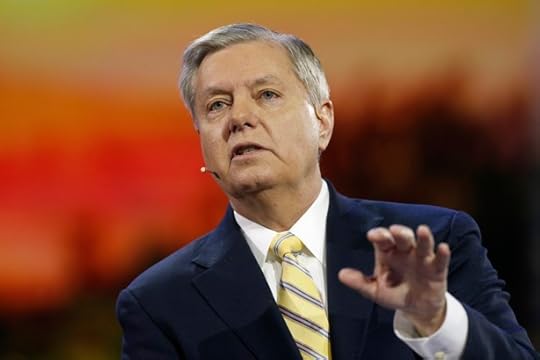
For Lindsey Graham, the timing couldn’t be better. The Republican senator from South Carolina is announcing a run for president Monday in the town of Central, just as key provisions of the PATRIOT Act are expiring. For a candidate who has made a hawkish platform the central—and practically sole—centerpiece of a campaign, it’s fortuitous timing.
Few analysts offer Graham much of a chance to win the race—although as Molly Ball points out, if you look at him from the right angle, he seems like a natural candidate. It might make the most sense to think about Graham as a Republican counterpart to Bernie Sanders. Both men hail from smaller states where they maintain strong wells of support. Both were elected to the House of Representatives in the 1990s and jumped to the Senate in the 2000s. And both are running campaigns that may be long shots, but aren’t really vanity campaigns. Sanders has already reframed the debate on the Democratic side, and Graham would like to guarantee there’s a loud, hawkish voice in the mix as the GOP chooses its candidate for 2016.
Unlike Sanders, whose stock in polls has risen as he becomes the leading counterweight to Hillary Clinton, Graham remains stuck in the cellar. He doesn’t even figure in RealClearPolitics’ averages of the Republican race. If he can’t make the cut for the August and September debates, which require placing in the top 10 in polls, he might struggle to gain real traction. But he stands to have an outsized influence in part because he’s from the Palmetto State, home to an important early primary. In particular, he could play spoiler to Jeb Bush.
Graham’s launch comes shortly after Democrat Martin O’Malley announced his own campaign with a Saturday event in Baltimore. Lincoln Chafee, another Democrat and a former Rhode Island senator and governor, is slated to make his announcement on June 3.
With so many candidates in the mix—some announced, some soon to announce, and some still on the fence—it’s tough to keep track of it all. To help out with that, this cheat sheet on the state of the presidential field will be periodically updated throughout the campaign season. Here's how things look right now.
* * *
The Republicans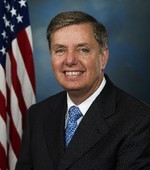 Wikimedia
Wikimedia Lindsey Graham
Who is he? A senator from South Carolina, he’s John McCain’s closest ally in the small caucus of Republicans who are moderate on many issues but very hawkish on foreign policy.
Is he running? He sure is. Graham kicks off the campaign June 1.
Who wants him to run? John McCain, naturally. Senator Kelly Ayotte, possibly. Joe Lieberman, maybe?
Can he win the nomination? Not really. The South Carolina senator seems to be running in large part to make sure there’s a credible, hawkish voice in the primary. It seems like Graham started his campaign almost as a lark but has started to enjoy the ride, plus he’s shown he’s a great performer on the stump. Molly Ball explores his chances at greater length here.
What else do we know? It’s still amazing that the man has never sent an email.
 Michael Vadon
Michael Vadon George Pataki
Who is he? Pataki ousted incumbent Mario Cuomo in 1994 and served three terms as governor of New York.
Is he running? Yes. He announced May 28.
Who wants him to run? It's not clear. Establishment Northeastern Republicans once held significant sway over the party, but those days have long since passed.
Can he win the nomination? No. As my colleague Russell Berman previously noted, Pataki is one of the longest of the long-shot GOP candidates. He has touted his leadership on 9/11, when he served as governor, but so did former New York City Mayor Rudy Giuliani. He was also a successful conservative governor in a deep-blue Northeastern state, but so was former Massachusetts Governor Mitt Romney. He seems be socially liberal enough to alienate primary voters, but not enough to capture Democrats.
Does his website have a good 404 page? No.
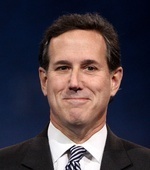 Gage Skidmore
Gage Skidmore Rick Santorum
Who is he? Santorum represented Pennsylvania in the Senate from 1995 until his defeat in 2006. He was the runner-up for the GOP nomination in 2012.
Is he running? Yes, with a formal announcement on May 27.
Who wants him to run? Social conservatives. The former Pennsylvania senator didn't have an obvious constituency in 2012, yet he still went a long way, and Foster Friess, who bankrolled much of Santorum's campaign then, is ready for another round.
Can he win the nomination? It's tough to imagine. Santorum himself said his chances would hinge on avoiding saying "crazy stuff that doesn't have anything to do with anything." For now, his poll numbers remain in the basement.
Does his website have a good 404 page? No.
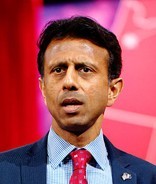 Gage Skidmore
Gage Skidmore Bobby Jindal
Who is he? A former Rhodes Scholar, he’s the outgoing governor of Louisiana. He previously served in the U.S. House.
Is he running? Probably. He announced on May 18 that he is forming an exploratory committee, with a final decision to come after Louisiana’s legislative session ends on June 11.
Who wants him to run? It’s hard to say. Jindal has assiduously courted conservative Christians, both with a powerful conversion story (he was raised Hindu but converted to Catholicism in high school) and policies (after other governors reversed course, he charged forward with a religious-freedom law). But he still trails other social conservatives like Ted Cruz and Mike Huckabee.
Can he win the nomination? Probably not. Jindal still lacks traction at the national level, he faces an overcrowded field of social conservatives, and his stewardship of the state of Louisiana has come in for harsh criticism even from staunch fiscal conservatives. It’s hard to see how he gains momentum from here.
What else do we know? In 1994, he wrote an article called “Physical Dimensions of Spiritual Warfare,” in which he described a friend’s apparent exorcism.
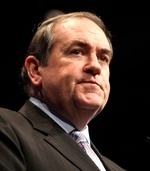 Gage Skidmore
Gage Skidmore Mike Huckabee
Who is he? An ordained preacher, former governor of Arkansas, and Fox News host, he ran a strong campaign in 2008, finishing third, but sat out 2012.
Is he running? Yes. He kicked off the campaign May 5.
Who wants him to run? Social conservatives; evangelical Christians.
Can he win the nomination? Huckabee's struggle will be to prove that he's still relevant. Since he last ran in 2008, a new breed of social conservatives has come in, and he'll have to compete with candidates like Ted Cruz. His brand of moral crusading feels a bit out of date in an era of widespread gay marriage—not least when curiously chose to attack Beyoncé. (His statements in support of Josh Duggar have also earned him criticism and quizzical reaction.) He faces fire from strict anti-tax conservative groups for tax hikes while he was governor. And fundraising has always been his weak suit. But Huckabee's combination of affable demeanor and strong conservatism resonates with voters.
What else do we know? Here is Huckabee's launch teaser video, with plenty of contrast with the Clintons.
Does his website have a good 404 page? It’s pretty good.
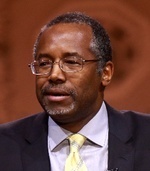 Gage Skidmore
Gage Skidmore Ben Carson
Who is he? A celebrated former head of pediatric neurosurgery at Johns Hopkins, Carson became a conservative folk hero after a broadside against Obamacare at the 2013 National Prayer Breakfast.
Is he running? Yes, after a May 4 announcement.
Who wants him to run? Grassroots conservatives, who have boosted him up near the top of polls, even as Republican insiders cringe. Carson has an incredibly appealing personal story—a voyage from poverty to pathbreaking neurosurgery—and none of the taint of politics.
Can he win the nomination? Almost certainly not. Carson's politics are conservative on some issues, but so eclectic as to be nearly incoherent overall. He's never run a political campaign, and has a tendency to do things like compare ISIS to the Founding Fathers. It's hard to imagine his candidacy surviving more serious scrutiny, but then again he's reportedly building an impressive political organization, especially in Iowa.
Does his website have a good 404 page? No.
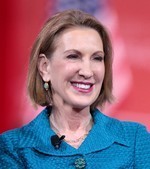 Gage Skidmore
Gage Skidmore Carly Fiorina
Who is she? Fiorina rose through the ranks to become CEO of Hewlett-Packard from 1999 to 2005, before being ousted in an acrimonious struggle. She advised John McCain’s 2008 presidential campaign and unsuccessfully challenged Senator Barbara Boxer of California in 2010.
Is she running? Yes, as of a May 4 announcement.
Who wants her to run? It isn’t clear what Fiorina’s constituency is. She’s a former CEO of Hewlett-Packard, but there are other business-friendly candidates in the race, all of whom have more electoral experience.
Can she win the nomination? Almost certainly not. Fiorina’s only previously political experience was a failed Senate campaign against Barbara Boxer in 2010. She has mostly been serving the role of harasser in the race so far, stirring up the news with slams on environmentalists for causing droughts (your guess is as good as mine), Obama for backing net neutrality, and Apple’s Tim Cook for speaking out on Indiana’s Religious Freedom Restoration Act. Mainly, though, she has strongly criticized Hillary Clinton, and some Republican strategists like the optics of having a woman to criticize Clinton so as to sidestep charges of sexism. Fiorina seems to be wowing voters in Iowa, but that hasn’t translated into national support—yet.
What else do we know? Fiorina's 2010 Senate race produced two of the most entertaining and wacky political ads ever, "Demon Sheep" and the nearly eight-minute epic commonly known as "The Boxer Blimp."
Does her website have a good 404 page? No.
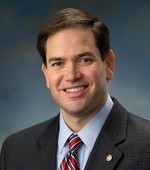 Wikimedia
Wikimedia Marco Rubio
Who is he? A second-generation Cuban-American and former speaker of the Florida House, Rubio was catapulted to national fame in the 2010 Senate election, after he unexpected upset Governor Charlie Crist to win the GOP nomination.
Is he running? Yes—he announced on April 13.
Who wants him to run? Rubio enjoys establishment support, and has sought to position himself as the candidate of an interventionist foreign policy.
Could he win the nomination? Charles Krauthammer pegs him as the Republican frontrunner. His best hope seems to be to emerge as a consensus candidate who can appeal to social conservatives and hawks, and he's even sounded some libertarian notes of late. He's well-liked by Republicans, and has surged forward since announcing, but he needs to move up from second choice to first choice for more of them. Rubio seems to scare Democrats more than any other candidate, too.
Does his website have a good 404 page? It’s decent.
 Wikimedia
Wikimedia Rand Paul
Who is he? An ophthalmologist and son of libertarian icon Ron Paul, he rode the 2010 Republican wave to the Senate, representing Kentucky.
Is he running? Yes, as of April 7.
Who wants him to run? Ron Paul fans; Tea Partiers; libertarians; civil libertarians; non-interventionist Republicans.
Can he win the nomination? That depends who you ask. The Kentucky senator would be an unorthodox pick, with many positions outside his party's mainstream. He's relatively permissive on drugs, passionate about civil liberties, and adamantly for restraint on foreign policy. But Paul has worked hard to firm up establishment ties since reaching the Senate, and he has recently worked to paper over his differences with GOP’s hawkish wing, calling for a declaration of war against ISIS and generally saber-rattling. He is positioning himself as a candidate with crossover appeal in the general election, and his announcement email mocked the idea that only an establishment candidate can win a general election.
What else do we know? One of Paul's greatest strengths is the base bequeathed to him by his father, three-time presidential candidate and former Representative Ron Paul. But as The Washington Post has reported, his father is also Senator Paul's biggest headache.
Does his website have a good 404 page? No.
 Wikimedia
Wikimedia Ted Cruz
Who is he? Cruz served as deputy assistant attorney general in the George W. Bush administration and was appointed Texas solicitor general in 2003. In 2012, he ran an insurgent campaign to beat a heavily favored establishment Republican for Senate.
Is he running? Yes. He launched his campaign March 23 at Liberty University in Virginia.
Who wants him to run? Hardcore conservatives; Tea Partiers who worry that Rand Paul is too dovish on foreign policy; social conservatives.
Can he win the nomination? Though his announcement gave Cruz both a monetary and visibility boost, he still starts with some serious weaknesses. Much of Cruz's appeal to his supporters—his outspoken stances and his willingness to thumb his nose at his own party—also imperil him in a primary or general election, and he's sometimes been is own worst enemy when it comes to strategy. But Cruz is familiar with running and winning as an underdog.
Does his website have a good 404 page? No.
 Gage Skidmore
Gage Skidmore Jeb Bush
Who is he? The brother and son of presidents, he served two terms as governor of Florida, from 1999 to 2007.
Is he running? Almost certainly.
Who wants him to run? Establishment Republicans; George W. Bush; major Wall Street donors.
Can he win the nomination? No one really knows. Since jumping into the race, he has continued to poll well and raise lots of money. He seems like a lock to rack up all-important endorsements from top Republicans. But predictions that he would quickly come to dominate the field have not come to pass, and while many analysts predicted that his moderate record would cause trouble in Iowa and with grassroots activists, that problem seems to be deeper than expected. His poll numbers are probably helped by his name, which is a double-edged sword.
When will he announce? No sooner than June, per The Washington Post.
What else do we know? Since Bush's surprise announcement, he has tended to stay fairly quiet, delivering some big speeches and hitting fundraisers, but not making a great number of trips to Iowa or New Hampshire.
Does his website have a good 404 page? No.
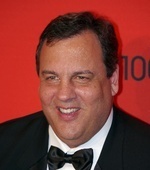 David Shankbone
David Shankbone Chris Christie
Who is he? What’s it to you, buddy? The combative New Jerseyan is in his second term as governor and previously served as a U.S. attorney.
Is he running? It seems ever harder to imagine. With indictments of two of his former top aides in early May, and a guilty plea by a high-school friend and political appointee, the George Washington Bridge scandal has crept ever closer to him. The New York Times says he's trying to "salvage" his campaign. Christie does have some campaign infrastructure in place in New Hampshire, which is close to his home state, with staffer hires and town-hall meetings there. He has also formed a political-action committee.
Who wants him to run? Moderate and establishment Republicans who don't like Bush or Romney; big businessmen, led by Home Depot founder Ken Langone.
Can he win the nomination? The tide of punditry had turned against Christie even before the "Bridgegate" indictments. It's hard to imagine how he recovers at this point, given the crowded field and the fact that Jeb Bush seems to dominate the moderate end of the Republican Party. Citing his horrific favorability nominations, FiveThirtyEight bluntly puns that "Christie's access lanes to the GOP nomination are closed." A recent Monmouth University poll showed him trailing even Donald Trump (see below) for the nomination. Plus, he'd probably have to resign as governor to run, because of SEC rules that cover donations from companies that do business with the state. With such high stakes, he might not want to run at all if he doesn't see a clear path to win.
When will he announce? According to Time, Christie has told donors that running is harder than he had realized, and that he may have to push back an announcement to as late as June.
What else do we know? If you can tell what is going on in this GIF, please let me know. Is he tossing the jacket away? Or catching it? And what does it mean?
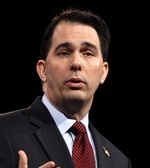 Gage Skidmore
Gage Skidmore Scott Walker
Who is he? Elected governor of Wisconsin in 2010, Walker earned conservative love and liberal hate for his anti-union policies. In 2013, he defeated a recall effort, and he won reelection the following year.
Is he running? Almost certainly.
Who wants him to run? Walker's record as governor of Wisconsin excites many Republicans. He's got a solid résumé as a small-government conservative. His social-conservative credentials are also strong, but without the culture-warrior baggage that sometimes brings. And Walker has won three difficult elections in a blue-ish state.
Can he win the nomination? No one knows. For all his strengths, Walker has never run a national campaign and isn't exactly Mr. Personality. But Jeb Bush's emergence seems to have helped Walker, propelling him to the front of the pack as a more conservative alternative to Bush. He's now solidly in the top tier of candidates.
When will he announce? June.
What else do we know? Barack Obama took a shot on April 7 at Walker for his criticism of a nuclear-deal framework with Iran. That's a sign that he's becoming a power player, and sniping from the White House is only likely to elevate Walker's standing with Republicans. Good news, bad news: Walker has a geographic advantage in his proximity to Iowa, but a potential biological disadvantage from his allergy to dogs.
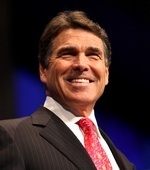 Gage Skidmore
Gage Skidmore Rick Perry
Who is he? George W. Bush’s successor at governor of Texas, he entered the 2012 race with high expectations, but sputtered out quickly. He left office in 2014 as the Lone Star State’s longest-serving governor.
Is he running? Very likely.
Who wants him to run? Small-government conservatives; Texans; immigration hardliners; foreign-policy hawks. Noah Rothman makes a case here. (Perry's top backer four years ago, non-relative Bob Perry, died in 2013.)
Can he win the nomination? Maybe, but who knows? Perry and his backers insist 2016 Perry will be the straight shooter who oversaw the so-called Texas miracle, not the meandering, spacey Perry of 2012. We'll see. Perry has also made a point of quietly spending lots of time in Iowa, a strategy he didn’t use in 2012—but which Rick Santorum used very successfully.
When will he announce? June 4.
 Gage Skidmore
Gage Skidmore Sarah Palin
Who is she? If you have to ask now, you must not have been around in 2008. That’s when John McCain selected the then-unknown Alaska governor as his running mate. After the ticket lost, she resigned her term early and became a television personality.
Is she running? A bizarre speech in January made a compelling case both ways.
Who wants her to run? Palin still has diehard grassroots fans, but there are fewer than ever.
Can she win the nomination? No.
When will she announce? It doesn't matter.
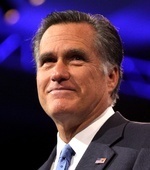 Gage Skidmore
Gage Skidmore Mitt Romney
Who is he? The Republican nominee in 2012 was also governor of Massachusetts and a successful businessman.
Is he running? Nah. He announced in late January that he would step aside.
Who wanted him to run? Former staffers; prominent Mormons; Hillary Clinton's team. Romney polled well, but it's hard to tell what his base would have been. Republican voters weren't exactly ecstatic about him in 2012, and that was before he ran a listless, unsuccessful campaign. Party leaders and past donors were skeptical at best of a third try.
Could he have won the nomination? He proved the answer was yes, but it didn't seem likely to happen again.
 Gage Skidmore John Bolton
Gage Skidmore John Bolton Who is he? A strident critic of the UN and leading hawk, he was George W. Bush’s ambassador to the UN for 17 months.
Is he running? Nope. After announcing his announcement, in the style of the big-time candidates, he posted on Facebook that he wasn’t running.
Who wanted him to run? Even among super-hawks, he didn’t seem to be a popular pick, likely because he had no political experience.
Could he have won the nomination? Quantum physics teaches that anything is possible, but this would push it. A likelier outcome could be a plum foreign-policy role in a hawkish GOP presidency.
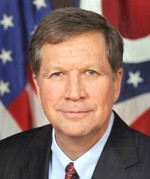 Wikimedia
Wikimedia John Kasich
Who is he? The current Ohio governor ran once before, in 2000, after a stint as Republican budget guru in the House. Between then and his election in 2010, he worked at Lehman Brothers. Molly Ball wrote the definitive profile in April.
Is he running? Almost certainly. He has visited early states, laid out ideas, and established a PAC.
Who wants him to run? Kasich’s pitch: He’s got better fiscal-conservative bona fides than any other candidate in the race, he’s proven he can win blue-collar voters, and he’s won twice in a crucial swing state. While his polling isn’t stellar, he still leads Graham, Fiorina, and Jindal.
Can he win the nomination? As Ball noted, Kasich seems in some ways perfectly suited to this race; in other ways, his insistent anti-charisma makes it hard to imagine him winning, and his attitude is amusingly blasé: “If they like it, great. If they don’t like it, I’ll play more golf.” He could be hurt by his embrace of Medicaid expansion under Obamacare, a move he had to circumvent the Republican-led General Assembly to make.
When will he announce? After June 30.
What else do we know? He doesn’t own a smartphone, and seldom uses a computer. Maybe he can be friends with Lindsey Graham—the old way, via U.S. Mail.
Donald Trump
Is he running?

Others Still in the Mix:
Bob Ehrlich, Peter King, Harold Stassen, Jim Gilmore
* * * The Democrats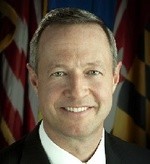 Wikimedia
Wikimedia Martin O'Malley
Who is he? He’s a former governor of Maryland and mayor of Baltimore.
Is he running? Yes. He announced his campaign on May 30.
Who wants him to run? Not clear. He has some of the leftism of Bernie Sanders or Elizabeth Warren, but without the same grassroots excitement.
Can he win the nomination? At the moment, O’Malley seems caught between Sanders, who has grasped the progressive mantle, and Clinton, who dominates the Democratic race overall. As with Sanders, though, it’s hard to see where O'Malley would get an opening unless Clinton’s campaign fell apart. The conventional wisdom since protests over the death of Freddie Gray is that protests in Baltimore undermine the case for his candidacy and make it harder for him to run, but he’s embraced the protests as a motivation for his run.
What else do we know? Have you heard that he plays in a Celtic rock band? You have? Oh.
Does his website have a good 404 page? No.
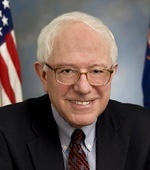 Wikimedia
Wikimedia Bernie Sanders
Who is he? A self-professed socialist, Sanders represented Vermont in the U.S. House from 1991 to 2007, when he won a seat in the Senate.
Is he running? Yes. He announced April 30.
Who wants him to run? Far-left Democrats; socialists; Brooklyn-accent aficionados.
Can he win the nomination? No, although his campaign seems more about getting his ideas into the mix than about winning. In particular, he's an outspoken opponent of the Trans-Pacific Partnership, the free-trade agreement President Obama is pushing. Hillary Clinton once seemed to back the deal, but she's offered far more equivocal statements since declaring her candidacy. But Sanders came out of the gate with strong fundraising numbers and has testily rebuffed reporters who suggest he can't win.
Does his website have a good 404 page? Yes, and it is quintessentially Sanders.
 Wikimedia
Wikimedia Hillary Clinton
Who is she? As if we have to tell you, but: She’s a trained attorney; former secretary of State in the Obama administration; former senator from New York; and former first lady.
Is she running? Yes.
Who wants her to run? Most of the Democratic Party.
Can she win the nomination? Duh.
What else do we know? Maybe a better question, after so many years with Clinton on the national scene, is what we don't know. Here are 10 central questions to ask about the Hillary Clinton campaign.
Does her website have a good 404 page? If you’re tolerant of bad puns and ’90s outfits, the answer is yes.
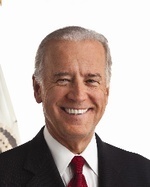 Wikimedia
Wikimedia Joe Biden
Who is he? Biden, a longtime Delaware senator, is vice president and foremost American advocate for aviator sunglasses and passenger rail.
Is he running? He won't rule it out, but he's made no serious steps toward a run. He's addressing a "secretive" group of gay donors on May 2.
Who wants him to run? Joe Biden, maybe. The group Draft Biden (slogan: “I’m Ridin’ With Biden”) continues to do its best.
Can he win the nomination? If Clinton didn't run, it would throw the Democratic field into disarray. But probably not.
When will he announce? It seems ever more likely that he won't.
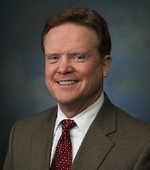 Wikimedia
Wikimedia Jim Webb
Who is he? Webb is a Vietnam war hero and secretary of the Navy. The author of several books, he served as a senator from Virginia from 2007 to 2013.
Is he running? He has launched an exploratory committee.
Who wants him to run? Dovish Democrats; socially conservative, economically populist Democrats; the Anybody-But-Hillary camp.
Can he win the nomination? Probably not.
Does his website have a good 404 page? No.
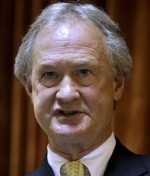 Steven Senne / AP
Steven Senne / AP Lincoln Chafee
Who is he? The son of beloved Rhode Island politician John Chafee, Linc took his late father’s seat in the U.S. Senate, serving as a Republican. He was governor, first as an independent and then as a Democrat.
Is he running? He has launched an exploratory committee.
Who wants him to run? No one knows! Chafee's exploratory committee came out of nowhere, with little anticipation or fanfare or even rumors. He opted not to seek reelection as governor in 2014, in part because his approval rating had reached a dismal 26 percent.
Can he win the nomination? No. Chafee seems to be positioning himself as an economic populist and says Clinton's 2002 vote for the Iraq war should disqualify her (he was the only Republican senator to vote against it). In other words: He's Jim Webb with a less impressive resume, a less compelling bio (he's the son of longtime Senator John Chafee), and less of a political base. He gives himself even odds, though.
When will he announce? He says he wants to gauge support and fundraising and then decide in the next few months.
Does his website have a good 404 page? No.
 Wikimedia
Wikimedia Elizabeth Warren
Who is she? Warren has taken an improbable path from Oklahoma, to Harvard Law School, to progressive heartthrob, to Massachusetts senator.
Is she running? No. Seriously, no.
Who wants her to run? Progressive Democrats; economic populists, disaffected Obamans, disaffected Bushites.
Can she win the nomination? No, because she's not running.









Are Democrats Prepared to Abandon Obama on Trade?
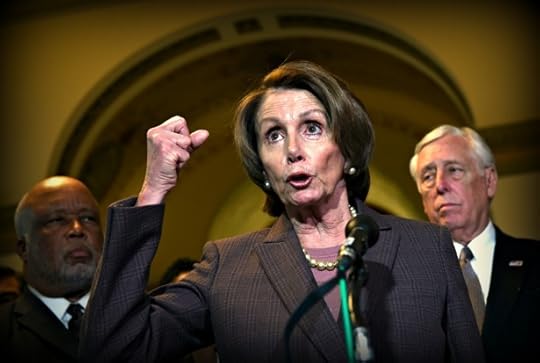
Sometime in the next two weeks, the House will hold one of the biggest votes of Barack Obama’s final two years in office, on whether to give the president the authority to negotiate trade deals that Congress won’t be able to amend. And unlike just about every other key vote during his administration, Obama will need only about 20 to 25 Democrats to support him—barely one-tenth of his own party.
This really shouldn’t be that difficult. Led by Nancy Pelosi, this Democratic caucus has stood loyally by Obama for his entire roller-coaster presidency—delivering him not only landmark stimulus, healthcare, and financial-reform legislation during his first term but also a series of hold-your-nose-and-vote-yes budget deals with Republicans in his second.
Yet despite months of public pressure and an aggressive private push from a man famously averse to schmoozing and arm-twisting, Democrats remain overwhelmingly opposed to a bill that Obama sees as crucial to extending his economic legacy. Some of the senior critics include lawmakers like Representatives Chris Van Hollen and Rosa DeLauro who regularly credit Obama with rescuing the nation from the Great Recession and transforming its healthcare system. And in another first for the Obama presidency, the White House has been left to whip votes without the public support of a single Democratic leader in Congress. “This thing is too close to call,” said Representative G.K. Butterfield, a North Carolina Democrat and the chairman of the Congressional Black Caucus. “I predict it will either pass or fail by a handful of votes.”
Related Story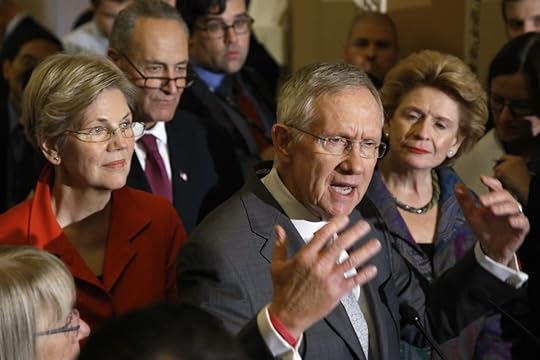
Senate Democrats Relent on Trade
Passage of Trade Promotion Authority would clear the way for the administration to finalize major trade agreements first with Pacific Rim nations (the Trans-Pacific Partnership) and then with the European Union. The bill passed after a contentious debate in the Senate, but the tougher battle has always been forecast for the House, where the Republican waves of 2010 and 2014 have ousted centrist Democrats and left a caucus that is both much smaller and more liberal. Republicans are predisposed to support trade deals, but the GOP leadership has consistently said it would need Democratic votes, because a few dozen of their 245 members won’t support anything that gives Obama more power.
Senior congressional aides in both parties say there are around 200 Republican votes for the bill, but just 17 or 18 Democrats—out of 188 total—in favor of it. That puts the count dangerously near the threshold of 217 or 218 (depending on how many absences there are) that the measure needs to pass. In recent weeks, the parties have bickered over which one bears the blame for TPA’s precarious status. The Obama administration has put on a full-court press over the last few months, with the president making calls and inviting groups of Democrats into the Oval Office for personal meetings. Overall, the administration said it has held more than 1,700 briefings for lawmakers with officials from the president on down—that works out to more than three for every member of the House and Senate, although some trade proponents complain that Obama’s loudest critics on the left have refused to attend them.
Republicans, and some Democrats, have long complained about the president’s poor relationship with Congress and what they see as his disregard for even the most token forms of outreach. (A round of golf, perhaps?) Yet even Obama’s critics acknowledge he has made a strong effort on trade. The problem, they say, is that the pleas from a lame-duck president don’t appear to have made much difference. “There’s no evidence that their engagement has moved a single vote from no to yes,” one top Republican aide told me, speaking on condition of anonymity, so as to be able to discuss the sensitive negotiations candidly.
Butterfield exemplifies Obama’s challenge, as do many members of the Congressional Black Caucus who often passionately defend the president but tend to find themselves the targets of his lobbying on the toughest votes. “My default position is no,” Butterfield said in an interview, repeating an explanation he says he delivered to Obama at the White House earlier this spring. But he has not completely closed the door to changing his mind, saying that while he is “leaning no,” he wants to see evidence from Obama and other proponents that the trade deals under consideration will create jobs in his district—and not merely grow the economy overall.
Broadly speaking, Democrats were traumatized by the experience of NAFTA, the Clinton-era agreement that they say never delivered on its promises, and which they blame for the outsourcing of jobs. (The position can sometimes be hard to square with the laudatory statements many of the same Democrats make about Bill Clinton’s economic record during the ’90s.) “NAFTA was a disaster—in my district anyway,” Butterfield said. “In some places in the country it may have been a bonanza, but in my district it was a disaster.”
“NAFTA was a disaster—in my district anyway. In some places in the country it may have been a bonanza, but in my district it was a disaster.”Obama and his allies have made several substantive arguments for why Democrats skeptical of trade deals should still give him the authority to negotiate them. First, they point to enforceable labor and environmental standards that making the Trans-Pacific Partnership “the most progressive” trade agreement in history. And they argue that it’s not a question of whether to trade with Pacific nations, but whether the U.S. can determine the rules, or whether a competitor like China will continue to undercut U.S. companies. “China will fill the vacuum if we’re not there,” said Representative Ron Kind of Wisconsin, chairman of the business-friendly New Democrat Coalition. Those arguments have resonated with lawmakers, but Obama has had to fend off criticism from Elizabeth Warren and others that the public cannot see the details of the pending agreements and that members of Congress can only review them in a “secret room” in the Capitol. The administration counters that the deal is still being negotiated and that the final agreement will be public for 60 days before Congress votes to approve or reject it. As Kind acknowledged: “It’s tough to sell something that doesn’t exist yet.”
The most potent argument for fence-sitting Democrats—both stated and implied—goes back to trust, loyalty, and politics. Obama has suffered all kinds of snubs and defeats at the hands of Republicans, but never one of this magnitude from his own party. “Do you really want to be the instrument of this kind of devastating loss for this president?” asked Representative Gerry Connolly, a Virginia Democrat and TPA supporter. An even more discouraging thought for Democrats is that with Republicans running both chambers of Congress, this might be the last significant legislation that Obama can get during his presidency. “A lot of my colleagues don’t want to contemplate that proposition,” Connelly said.
Butterfield said Obama hasn’t made this kind of hard sell, but he has framed Trade Promotion Authority as a question of trust. “Give me some degree of confidence that I’m going to do the right thing,” he said the president told him. “That’s a pretty compelling argument, because I do trust the president, and I believe he has the best interest of middle-class Americans at heart.” And yet, Butterfield still isn’t sold. “I’m looking to the proponents to prove to me that real jobs are going to be created, and they haven’t met that burden,” he told me.
“Do you really want to be the instrument of this kind of devastating loss for this president?”Campaigning against TPA are labor leaders, who have reportedly threatened to back primary campaigns against Democrats who support the trade deal. But it’s unclear whether rank-and-file Democrats share the concerns of their representatives or of labor and progressive leaders. A Pew Research Study released last week found 58 percent of Democrats—including 59 percent who identify as liberals—believe that trade agreements have been “a good thing for the U.S.” That’s a slightly higher percentage even than for Republicans, whose representatives overwhelmingly back Obama on this issue.
The battle between the Obama and liberal activists has left Democratic congressional leaders caught in the middle. In the Senate, Minority Leader Harry Reid made clear his opposition to TPA, but he let it pass anyway. The top three Democrats in the House—Pelosi, Steny Hoyer, and James Clyburn—have all remained neutral thus far, adding another layer of mystery to the vote. (The same goes for Hillary Clinton, who plans to dodge the question until the final trade deal comes out.) Supporters have noted that Pelosi has worked with the administration to set up briefings for lawmakers, and Hoyer has backed trade deals before. “Not one of those three leaders wants to see this president fail,” Connolly said.
On the Republican side, Paul Ryan—the party’s most trusted policymaker—has been leading the effort to shore up support, and with several Obama allies still among the persuadable, officials have been sounding more optimistic in recent days. “There’s growing confidence we can get this done,” the senior Republican aide said. Kind added: “I do expect it to pass. This is very big, and we’ve never lost a trade vote before.”
If it does pass, it may come down to Democrats like Butterfield, torn between a president they want to succeed and an issue on which they’ve felt burned before. Butterfield predicted the vote would be close—one of those held open for a long time, as members lobby their undecided colleagues on the floor and others duck into the cloak room to take last-minute calls from the White House. And what would he do if Obama was on the line at that moment, asking for his trust one more time? “I would go into deep prayer,” Butterfield replied.









May 31, 2015
Thailand's Royal Conundrum

On Friday, King Bhumibol Adulyadej, Thailand’s monarch since 1946, was again hospitalized just three weeks after his release from a seven month confinement. The 87-year-old king’s health has long been precarious—he has been in and out of Thai hospitals with various ailments since 2009. But his latest hospitalization has come at a trying time for his country, whose political life was upended after a military coup last year.
Few countries in the world are as divided as Thailand. The country has experienced 19 separate coups since adopting constitutional government in 1932, and even its elected governments have struggled to include and tolerate opposition. Since 2001, these divisions have become even more entrenched. That year, the telecommunications billionaire Thaksin Shinawatra was elected prime minister on a platform of aiding Thailand’s rural poor, who have received few spoils from the country’s decades of fast-paced economic development. Five years later, Thaksin, beset with accusations of cronyism and graft, was ousted by the military and forced into exile.
“When the music stops — when the king dies — whoever has power gets to organize the next steps.”In 2011, Thaksin’s sister Yingluck assumed the prime ministership and vowed to carry on Thaksin’s agenda. But last May, following months of violent protest, she herself was removed in a coup and now awaits trial on corruption charges. In the last 12 months, the military regime has eroded democratic institutions by installing generals in key positions and sidelining technocrats. New elections are not scheduled until 2016.
“Thailand’s new military leaders view themselves as a kind of cleanup crew, tasked with eradicating corruption, keeping politicians in line, and restoring the old order,” wrote Thitinan Pongsudhirak, a Thai academic, in Project Syndicate.
The only force that unifies Thailand is the king. The monarch is regarded as a near-deity in the country, where his image is a ubiquitous presence in homes and businesses across the country. Any criticism or slander of him is strictly prohibited, and both Thai and foreign nationals are routinely imprisoned under the country’s strict lese majeste laws. In 2011, a 61-year-old Thai man was sentenced to 20 years in prison for sending text messages deemed offensive to the queen. In Thai politics, the king functions as an arbiter between the rural poor—who are loyal to Thaksin and Yingluck Shinawatra—and the urban elite whose interests are represented by the military. This system, however imperfect, has largely kept Thailand from collapse.
But what happens when the king dies? His son and appointed successor, Crown Prince Maha Vajiralonkorn, is a widely loathed playboy whose past ties to Thaksin have aroused the suspicion of the military. Last fall, the crown prince raised eyebrows by requesting that the government strip his wife of her royally-bestowed title amid the arrest of several of her family members. According to the International Business Times, Vajiralonkorn has recruited soldiers from Thailand’s northeast region to serve in a royal guard corps—a possible hedge against the possibility that his succession to the throne is questioned.
All this political uncertainty has damaged Thailand’s economy, which is Southeast Asia’s second-largest. Household spending has slumped and exports—hamstrung by the excessive strength of Thailand’s currency, the baht, have been disappointing. For decades, Thailand was seen as an oasis of success in a region beset by war, genocide, and stagnation. Now, Myanmar, Cambodia, Laos, and Vietnam are all growing faster than their once-exceptional neighbor.
As the health of King Bhumibol remains in peril, his 69 million subjects nervously wonder what will happen as soon as his remarkable life comes to an end.
“It’s like a musical chairs game,” Ernest Bower, an expert on Thailand at the Center for Strategic and International Studies, told the Washington Post. “When the music stops — when the king dies — whoever has power gets to organize the next steps.”









A Little Life: The Great Gay Novel Might Be Here

In a 2013 essay for Salon, the culture writer Daniel D’Addario lamented the absence of a big, ambitious novel about gay life in America today. While the number of LGBT characters in mainstream novels has increased, he argued, they’re too often relegated to subplots or “window dressing,” their lives left “sketchy and oblique.” D’Addario surveyed a number of prominent gay writers about his thesis, and the next day Tyler Coates summarized their views for Flavorwire in a piece titled “The Great Gay Novel is Never Going to Happen.”
Related Story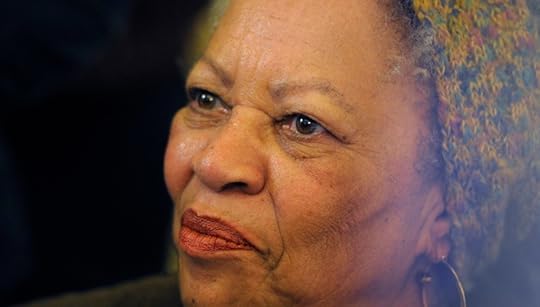
But I think it’s possible that novel has happened, even if no one has quite realized it yet. Hanya Yanagihara’s A Little Life, which was released in March, is one of the most buzzed-about books of the season, hailed as a “tour de force,” “extraordinary,” “elemental and irreducible,” “astonishing,” and the work of “a major American novelist.” But no coverage of the book I’ve seen has discussed it as a novel fundamentally about gay lives—as the most ambitious chronicle of the social and emotional lives of gay men to have emerged for many years.
The book follows a group of four men—Jude, Willem, JB, and Malcolm—over three decades of friendship, from their years as college roommates to the heights of professional success. Three of them form their primary physical and emotional bonds with other men, though sometimes in ways that challenge the usual nomenclatures. Of the novel’s main characters, only JB unambiguously embodies an immediately recognizable and unambivalent gay identity. Willem spends much of his adulthood pursuing sexual relationships with women, before he recognizes his desire for Jude and acknowledges their friendship as a life partnership. In college, JB calls Jude “the Postman” because he seems to entirely escape the usual categories: “We never see him with anyone, we don’t know what race he is, we don’t know anything about him … [He’s] post-sexual, post-racial, post-identity, post-past.”
The complexity of the characters’ relationships to sexual identity is one way Yanagihara elevates them from mere “window dressing,” and I suspect it’s one reason A Little Life hasn’t been recognized as a book fundamentally about gay male experience. Another is that readers have come to expect such books to be written by gay men and to be at least plausibly confessional. From Edmund White’s A Boy’s Own Story (1982) to Justin Torres’ We the Animals (2011), novels about gay men and their lives have often been more or less easily mappable onto the author’s biography. In essays and interviews, Yanagihara has spoken of her desire instead to write across difference, exploring what she sees as specifically male friendships and emotional communication.
Just as Yanagihara’s characters challenge conventional categories of gay identity, so A Little Life avoids the familiar narratives of gay fiction. Yanagihara approaches the collective traumas that have so deeply shaped modern gay identity—sickness and discrimination—obliquely, avoiding the conventions of the coming-out narrative or the AIDS novel. Her characters suffer relatively little anxiety about the public reception of their sexual identities—only Malcolm will be tormented by coming out, before realizing that in fact he’s straight—and HIV is conspicuously absent from the book’s weirdly ahistorical New York City.
Yanagihara approaches the collective traumas that have so deeply shaped gay life obliquelyBut queer suffering is at the heart of A Little Life. The novel centers on Jude, who’s 16 when he arrives at an affluent New England college with only a backpack of baggy clothes. Parentless and horribly scarred, with his legs disfigured in an incident whose details he guards as closely as everything else about his past, he’s profoundly aware of his “extreme otherness.” The book slowly discloses luridly gothic episodes from his life before college, among them abandonment, childhood in a monastery, horrifying physical and sexual abuse, prostitution, and abduction. “You were made for this, Jude,” he’s told by the only adult he loves, a monk who betrays his trust, and Jude comes to believe that his suffering is a consequence of what he is: “He had been born, and left, and found, and used as he had been intended to be used.”
Jude’s childhood is an extreme iteration of the abandonment, exploitation, and abuse that remain endemic in the experience of queer young people. Recent discussion of that experience has been dominated by an affirmative narrative—“It Gets Better”—that may be true for most. But it isn’t true for Jude. Even as he acquires wealth and power, Jude’s sense of the logic of his life never changes. His self-loathing is shocking from the start, and only grows more abject: he is “a nothing,” “rotten,” “useless,” “ugly,” “a piece of junk,” “inhuman … deficient … disgusting.” “Every year, his right to humanness diminished,” he reflects late in the novel; “every year, he became less and less of a person.” After the abuse he has suffered, he will never be able to able to enjoy sex, even as he craves the physical and emotional intimacy he finds in his partnership with Willem.
Both the intensity of pain Jude endures and other aspects of his and his friends’ lives—each is brilliant, each becomes not just successful but famous—strain credulity, and while Yanagihara has insisted that the novel’s plot is “not, technically, implausible,” it’s clear that the book is after something other than strict realism. This has annoyed some critics. In The New York Times Book Review, Carol Anshaw accused the novel both of being “allegorical” in its disregard for social and historical reality, and of placing the reader in a voyeuristic attitude toward suffering that’s so baroque as to seem like “a contrivance.”
To understand the novel’s exaggeration and its intense, claustrophobic focus on its characters’ inner lives requires recognizing how it engages with aesthetic modes long coded as queer: melodrama, sentimental fiction, grand opera. The book is scaled to the intensity of Jude’s inner life, and for long passages it forces the reader to experience a world that’s brutally warped by suffering. Again and again A Little Life conveys Jude’s sense of himself through elaborate metaphor: he is “a scrap of bloodied, muddied cloth,” “a blank, faceless prairie under whose yellow surface earthworms and beetles wriggled,” “a scooped out husk.” His memories are “hyenas,” his fear “a flock of flapping bats,” his self-hatred a “beast.” This language infects those closest to him, so that for Willem, learning about his childhood is “plunging an arm into the snake- and centipede-squirming muck of Jude’s past.” In its sometimes grueling descriptions of Jude’s self-harm and his perceptions of his own body, the book reminds readers of the long filiation between gay art and the freakish, the abnormal, the extreme—those aspects of queer culture we’ve been encouraged to forget in an era that’s increasingly embracing gay marriage and homonormativity.
The book reminds readers of the long filiation between gay art and the freakish, the abnormal, the extreme.This is not a register of feeling or expression readers are accustomed to in American literary fiction. Yanagihara has described the experience of writing the novel as “a fever dream,” and reading it induces a similar effect. Part of this is due to the novel’s structural conceit: In nearly every section, a present-moment scene is interrupted for dozens of pages by elaborate flashbacks, mimicking the way Jude’s past irrupts into his present. Combined with the novel’s emotional extremity and the tightness of its focus on Jude’s consciousness, this nonlinear structure produces a feeling of immersion that’s almost unprecedented in my experience as a reader.
The novel’s darkness is leavened by its portrayal of Jude’s friends, whose attempts to care for him inevitably recall the communities of care formed by LGBT people in response to the AIDS crisis. Each of Jude’s friends cares for him differently, uniquely: Malcolm by designing spaces that will accommodate his disability; JB by painting portraits “kinder than the eye alone would see”; Willem by being the one person to whom he can tell his entire history. They make innumerable accommodations to Jude’s daily needs; in periods of crisis, they monitor him, making sure he eats and doesn’t harm himself.
The book vigorously defends friendship as a primary relationship, as central as marriage to the making of lives and communities. “Why wasn’t friendship as good as a relationship?” Willem thinks early in the novel. “Why wasn’t it even better?” For Jude, his friends “had imagined his life for him … they had allowed him to believe in possibilities that he would never have conceived.” Their relationships with one another challenge categorization. “They were inventing their own type of relationship,” Willem thinks of Jude, “one that wasn't officially recognized by history or immortalized in poetry or song, but which felt truer and less constraining.”
These passages recall similar defenses of friendship from queer writers before the age of marriage equality, especially Edmund White. “And friendship will be elevated into the supreme consolation for this continuing tragedy, human existence,” White wrote in 1983, as he was beginning to understand both the scope of the AIDS crisis and the need for novel social arrangements to sustain queer communities through it.
“It might have been mawkish,” one character thinks about his feeling for Jude, “but it was also true.” This is the claim that animates A Little Life: that by violating the canons of current literary taste, by embracing melodrama and exaggeration and sentiment, it can access emotional truths denied more modest means of expression. In this astonishing novel, Yanagihara achieves what great gay art from Proust to Almodóvar has so often sought: a grandeur of feeling adequate to “the terrifying largeness, the impossibility of the world.”









May 30, 2015
'American Universities Are Addicted to Chinese Students'

A startling number of Chinese students are getting kicked out of American colleges. According to a white paper published by WholeRen, a Pittsburgh-based consultancy, an estimated 8,000 students from China were expelled from universities and colleges across the United States in 2013-4. The vast majority of these students—around 80 percent—were removed due to cheating or failing their classes.
As long as universities have existed, students have found a way to get expelled from them. But the prevalence of expulsions of Chinese students should be a source of alarm for American university administrators. According to the Institute of International Education, 274,439 students from China attended school in the United States in 2013-4, a 16 percent jump from the year before. Chinese students represent 31 percent of all international students in the country and contributed an estimated $22 billion to the U.S. economy in 2014.
“American universities are addicted to Chinese students.”In the past, Chinese students in the United States tended to be graduate students living on tight budgets. Now, a large number of students come from China’s wealthiest and most powerful families—the daughter of President Xi Jinping, for example, studied under an assumed name at Harvard. The presence of wealthy Chinese students at American universities has even caught the attention of luxury brands eager to capitalize on them. Bergdorf Goodman, the New York City-based department store, sponsored Chinese New Year celebrations at NYU and Columbia, while Bloomingdales organized a fashion show for Chinese students at their shopping center in Chicago.
Chinese students have become a big market in the United States—and nobody understands this better than the universities themselves. Over 60 percent of Chinese students cover the full cost of an American university education themselves, effectively subsidizing the education of their lower-income American peers. Some schools—such as Purdue University in Indiana—profit further by charging additional fees for international students.
But the symbiotic relationship between cash-strapped American schools and Chinese students is not without its problems. Demand for an overseas education has spawned a cottage industry of businesses in China that help students prepare their applications. The industry is poorly regulated and fraud is rampant. According to Zinch China, an education consulting company, 90 percent of Chinese applicants submit fake recommendations, 70 percent have other people write their essays, 50 percent have forged high school transcripts, and 10 percent list academic awards and other achievements they did not receive. As a result, many students arrive in the U.S. and find that their English isn’t good enough to follow lectures or write papers.
Until recently, American schools have been happy to look the other way.
“American universities are addicted to Chinese students,” Parke Muth, a Virginia-based education consultant with extensive experience in China, told me last year. “They're good test takers. They tend not to get into too much trouble. They're not party animals. The schools are getting a lot of money, and they, frankly, are not doing a lot in terms of orientation.”
Is the relationship between Chinese students and American universities sustainable? The Chinese government has invested billions of dollars in improving its own tertiary education system in an attempt to persuade students to remain in the country.
“China is beefing up their labs, their research, while in the U.S. they've cut back,” said Muth. “At the grad level, students are staying in China because now they're starting to be able to compete.”
For American universities, expelling Chinese students may someday be an overture to a bigger problem—them not coming at all.









The 2016 U.S. Presidential Race: A Cheat Sheet
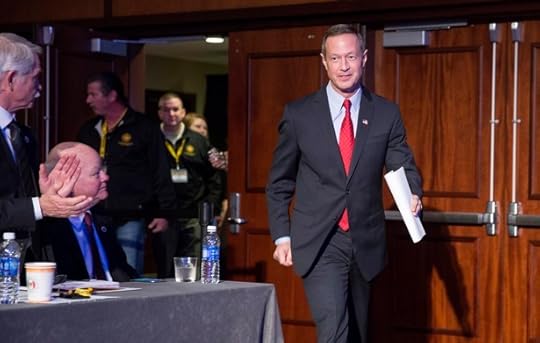
For months, it looked like Martin O’Malley might be the only person brave enough to challenge Hillary Clinton for the 2016 Democratic nomination. Between her dominance and the Clintons’ legendarily long memory for slights, she seemed to have convinced most potential rivals not to bother.
But the Democratic field that the former Maryland governor joined on Saturday doesn’t look quite like what was expected. Yes, Clinton still has a comfortable lead over all rivals. But the rest of the ballot is more crowded. Jim Webb seems set to run. Lincoln Chafee is slated to announce a run on June 3. Most of all, Senator Bernie Sanders has become an unexpected force in the race.
The Sanders ascendancy is a challenge for O’Malley, who seemed to be aiming for the territory to Clinton’s left; O’Malley has criticized the former secretary of state over the Trans-Pacific Partnership. Another challenge is the recent unrest in Baltimore. Critics charge that data-based policing tactics that O’Malley ushered in as mayor helped create the tension between police and citizens that boiled over after the death of Freddie Gray. By announcing his campaign in Baltimore, O’Malley signaled that he intends to take that criticism on head-on. In statements since rioting and protests, he has suggested that such tensions are in fact exactly why he feels compelled to run.
O’Malley followed several other candidates who announced this week: Sanders, who had already announced his candidacy, held a campaign kick-off on May 26. Republicans Rick Santorum and George Pataki followed over the next two days. And there are two more announcements expected next week—Republican Lindsey Graham, on June 1, and Chafee, on June 3.
With so many candidates in the mix—some announced, some soon to announce, and some still on the fence—it’s tough to keep track of it all. To help out with that, this cheat sheet on the state of the presidential field will be periodically updated throughout the campaign season. Here's how things look right now.
* * *
The Democrats Wikimedia
Wikimedia Martin O'Malley
Who is he? He’s a former governor of Maryland and mayor of Baltimore.
Is he running? Yes. He announced his campaign on May 30.
Who wants him to run? Not clear. He has some of the leftism of Bernie Sanders or Elizabeth Warren, but without the same grassroots excitement.
Can he win the nomination? At the moment, O’Malley seems caught between Sanders, who has grasped the progressive mantle, and Clinton, who dominates the Democratic race overall. As with Sanders, though, it’s hard to see where O'Malley would get an opening unless Clinton’s campaign fell apart. The conventional wisdom since protests over the death of Freddie Gray is that protests in Baltimore undermine the case for his candidacy and make it harder for him to run, but he’s embraced the protests as a motivation for his run.
What else do we know? Have you heard that he plays in a Celtic rock band? You have? Oh.
Does his website have a good 404 page? No.
 Wikimedia
Wikimedia Bernie Sanders
Who is he? A self-professed socialist, Sanders represented Vermont in the U.S. House from 1991 to 2007, when he won a seat in the Senate.
Is he running? Yes. He announced April 30.
Who wants him to run? Far-left Democrats; socialists; Brooklyn-accent aficionados.
Can he win the nomination? No, although his campaign seems more about getting his ideas into the mix than about winning. In particular, he's an outspoken opponent of the Trans-Pacific Partnership, the free-trade agreement President Obama is pushing. Hillary Clinton once seemed to back the deal, but she's offered far more equivocal statements since declaring her candidacy. But Sanders came out of the gate with strong fundraising numbers and has testily rebuffed reporters who suggest he can't win.
Does his website have a good 404 page? Yes, and it is quintessentially Sanders.
 Wikimedia
Wikimedia Hillary Clinton
Who is she? As if we have to tell you, but: She’s a trained attorney; former secretary of State in the Obama administration; former senator from New York; and former first lady.
Is she running? Yes.
Who wants her to run? Most of the Democratic Party.
Can she win the nomination? Duh.
What else do we know? Maybe a better question, after so many years with Clinton on the national scene, is what we don't know. Here are 10 central questions to ask about the Hillary Clinton campaign.
Does her website have a good 404 page? If you’re tolerant of bad puns and ’90s outfits, the answer is yes.
 Wikimedia
Wikimedia Joe Biden
Who is he? Biden, a longtime Delaware senator, is vice president and foremost American advocate for aviator sunglasses and passenger rail.
Is he running? He won't rule it out, but he's made no serious steps toward a run. He's addressing a "secretive" group of gay donors on May 2.
Who wants him to run? Joe Biden, maybe. The group Draft Biden (slogan: “I’m Ridin’ With Biden”) continues to do its best.
Can he win the nomination? If Clinton didn't run, it would throw the Democratic field into disarray. But probably not.
When will he announce? It seems ever more likely that he won't.
 Wikimedia
Wikimedia Jim Webb
Who is he? Webb is a Vietnam war hero and secretary of the Navy. The author of several books, he served as a senator from Virginia from 2007 to 2013.
Is he running? He has launched an exploratory committee.
Who wants him to run? Dovish Democrats; socially conservative, economically populist Democrats; the Anybody-But-Hillary camp.
Can he win the nomination? Probably not.
Does his website have a good 404 page? No.
 Steven Senne / AP
Steven Senne / AP Lincoln Chafee
Who is he? The son of beloved Rhode Island politician John Chafee, Linc took his late father’s seat in the U.S. Senate, serving as a Republican. He was governor, first as an independent and then as a Democrat.
Is he running? He has launched an exploratory committee.
Who wants him to run? No one knows! Chafee's exploratory committee came out of nowhere, with little anticipation or fanfare or even rumors. He opted not to seek reelection as governor in 2014, in part because his approval rating had reached a dismal 26 percent.
Can he win the nomination? No. Chafee seems to be positioning himself as an economic populist and says Clinton's 2002 vote for the Iraq war should disqualify her (he was the only Republican senator to vote against it). In other words: He's Jim Webb with a less impressive resume, a less compelling bio (he's the son of longtime Senator John Chafee), and less of a political base. He gives himself even odds, though.
When will he announce? He says he wants to gauge support and fundraising and then decide in the next few months.
Does his website have a good 404 page? No.
 Wikimedia
Wikimedia Elizabeth Warren
Who is she? Warren has taken an improbable path from Oklahoma, to Harvard Law School, to progressive heartthrob, to Massachusetts senator.
Is she running? No. Seriously, no.
Who wants her to run? Progressive Democrats; economic populists, disaffected Obamans, disaffected Bushites.
Can she win the nomination? No, because she's not running.
* * * The Republicans Michael Vadon
Michael Vadon George Pataki
Who is he? Pataki ousted incumbent Mario Cuomo in 1994 and served three terms as governor of New York.
Is he running? Yes. He announced May 28.
Who wants him to run? It's not clear. Establishment Northeastern Republicans once held significant sway over the party, but those days have long since passed.
Can he win the nomination? No. As my colleague Russell Berman previously noted, Pataki is one of the longest of the long-shot GOP candidates. He has touted his leadership as governor of New York on 9/11, but so did former New York City Mayor Rudy Giuliani. He was also a successful conservative governor in a deep-blue Northeastern state, but so was former Massachusetts Governor Mitt Romney. He seems be socially liberal enough to alienate primary voters, but not enough to capture Democrats.
Does his website have a good 404 page? No.
 Gage Skidmore
Gage Skidmore Rick Santorum
Who is he? Santorum represented Pennsylvania in the Senate from 1995 until his defeat in 2006. He was the runner-up for the GOP nomination in 2012.
Is he running? Yes, with a formal announcement on May 27.
Who wants him to run? Social conservatives. The former Pennsylvania senator didn't have an obvious constituency in 2012, yet he still went a long way, and Foster Friess, who bankrolled much of Santorum's campaign then, is ready for another round.
Can he win the nomination? It's tough to imagine. Santorum himself said his chances would hinge on avoiding saying "crazy stuff that doesn't have anything to do with anything." For now, his poll numbers remain in the basement.
Does his website have a good 404 page? No.
 Gage Skidmore
Gage Skidmore Bobby Jindal
Who is he? A former Rhodes Scholar, he’s the outgoing governor of Louisiana. He previously served in the U.S. House.
Is he running? Probably. He announced on May 18 that he is forming an exploratory committee, with a final decision to come after Louisiana’s legislative session ends on June 11.
Who wants him to run? It’s hard to say. Jindal has assiduously courted conservative Christians, both with a powerful conversion story (he was raised Hindu but converted to Catholicism in high school) and policies (after other governors reversed course, he charged forward with a religious-freedom law). But he still trails other social conservatives like Ted Cruz and Mike Huckabee.
Can he win the nomination? Probably not. Jindal still lacks traction at the national level, he faces an overcrowded field of social conservatives, and his stewardship of the state of Louisiana has come in for harsh criticism even from staunch fiscal conservatives. It’s hard to see how he gains momentum from here.
What else do we know? In 1994, he wrote an article called “Physical Dimensions of Spiritual Warfare,” in which he described a friend’s apparent exorcism.
 Wikimedia
Wikimedia Lindsey Graham
Who is he? A senator from South Carolina, he’s John McCain’s closest ally in the small caucus of Republicans who are moderate on many issues but very hawkish on foreign policy.
Is he running? Sure, why not?
Who wants him to run? John McCain, naturally. Senator Kelly Ayotte, possibly. Joe Lieberman, maybe?
Can he win the nomination? Not really. The South Carolina senator seems to be running in large part to make sure there’s a credible, hawkish voice in the primary. It seems like Graham started his campaign almost as a lark but has started to get into and enjoy the ride, plus he’s shown he’s a great performer on the stump. Molly Ball explores his chances in greater length here.
When will he announce? June 1.
What else do we know? It’s still amazing that the man has never sent an email.
 Gage Skidmore
Gage Skidmore Mike Huckabee
Who is he? An ordained preacher, former governor of Arkansas, and Fox News host, he ran a strong campaign in 2008, finishing third, but sat out 2012.
Is he running? Yes. He kicked off the campaign May 5.
Who wants him to run? Social conservatives; evangelical Christians.
Can he win the nomination? Huckabee's struggle will be to prove that he's still relevant. Since he last ran in 2008, a new breed of social conservatives has come in, and he'll have to compete with candidates like Ted Cruz. His brand of moral crusading feels a bit out of date in an era of widespread gay marriage—not least when curiously chose to attack Beyoncé. (His statements in support of Josh Duggar have also earned him criticism and quizzical reaction.) He faces fire from strict anti-tax conservative groups for tax hikes while he was governor. And fundraising has always been his weak suit. But Huckabee's combination of affable demeanor and strong conservatism resonates with voters.
What else do we know? Here is Huckabee's launch teaser video, with plenty of contrast with the Clintons.
Does his website have a good 404 page? It’s pretty good.
 Gage Skidmore
Gage Skidmore Ben Carson
Who is he? A celebrated former head of pediatric neurosurgery at Johns Hopkins, Carson became a conservative folk hero after a broadside against Obamacare at the 2013 National Prayer Breakfast.
Is he running? Yes, after a May 4 announcement.
Who wants him to run? Grassroots conservatives, who have boosted him up near the top of polls, even as Republican insiders cringe. Carson has an incredibly appealing personal story—a voyage from poverty to pathbreaking neurosurgery—and none of the taint of politics.
Can he win the nomination? Almost certainly not. Carson's politics are conservative on some issues, but so eclectic as to be nearly incoherent overall. He's never run a political campaign, and has a tendency to do things like compare ISIS to the Founding Fathers. It's hard to imagine his candidacy surviving more serious scrutiny, but then again he's reportedly building an impressive political organization, especially in Iowa.
Does his website have a good 404 page? No.
 Gage Skidmore
Gage Skidmore Carly Fiorina
Who is she? Fiorina rose through the ranks to become CEO of Hewlett-Packard from 1999 to 2005, before being ousted in an acrimonious struggle. She advised John McCain’s 2008 presidential campaign and unsuccessfully challenged Senator Barbara Boxer of California in 2010.
Is she running? Yes, as of a May 4 announcement.
Who wants her to run? It isn’t clear what Fiorina’s constituency is. She’s a former CEO of Hewlett-Packard, but there are other business-friendly candidates in the race, all of whom have more electoral experience.
Can she win the nomination? Almost certainly not. Fiorina’s only previously political experience was a failed Senate campaign against Barbara Boxer in 2010. She has mostly been serving the role of harasser in the race so far, stirring up the news with slams on environmentalists for causing droughts (your guess is as good as mine), Obama for backing net neutrality, and Apple’s Tim Cook for speaking out on Indiana’s Religious Freedom Restoration Act. Mainly, though, she has strongly criticized Hillary Clinton, and some Republican strategists like the optics of having a woman to criticize Clinton so as to sidestep charges of sexism. Fiorina seems to be wowing voters in Iowa, but that hasn’t translated into national support—yet.
What else do we know? Fiorina's 2010 Senate race produced two of the most entertaining and wacky political ads ever, "Demon Sheep" and the nearly eight-minute epic commonly known as "The Boxer Blimp."
Does her website have a good 404 page? No.
 Wikimedia
Wikimedia Marco Rubio
Who is he? A second-generation Cuban-American and former speaker of the Florida House, Rubio was catapulted to national fame in the 2010 Senate election, after he unexpected upset Governor Charlie Crist to win the GOP nomination.
Is he running? Yes—he announced on April 13.
Who wants him to run? Rubio enjoys establishment support, and has sought to position himself as the candidate of an interventionist foreign policy.
Could he win the nomination? Charles Krauthammer pegs him as the Republican frontrunner. His best hope seems to be to emerge as a consensus candidate who can appeal to social conservatives and hawks, and he's even sounded some libertarian notes of late. He's well-liked by Republicans, and has surged forward since announcing, but he needs to move up from second choice to first choice for more of them. Rubio seems to scare Democrats more than any other candidate, too.
Does his website have a good 404 page? It’s decent.
 Wikimedia
Wikimedia Rand Paul
Who is he? An ophthalmologist and son of libertarian icon Ron Paul, he rode the 2010 Republican wave to the Senate, representing Kentucky.
Is he running? Yes, as of April 7.
Who wants him to run? Ron Paul fans; Tea Partiers; libertarians; civil libertarians; non-interventionist Republicans.
Can he win the nomination? That depends who you ask. The Kentucky senator would be an unorthodox pick, with many positions outside his party's mainstream. He's relatively permissive on drugs, passionate about civil liberties, and adamantly for restraint on foreign policy. But Paul has worked hard to firm up establishment ties since reaching the Senate, and he has recently worked to paper over his differences with GOP’s hawkish wing, calling for a declaration of war against ISIS and generally saber-rattling. He is positioning himself as a candidate with crossover appeal in the general election, and his announcement email mocked the idea that only an establishment candidate can win a general election.
What else do we know? One of Paul's greatest strengths is the base bequeathed to him by his father, three-time presidential candidate and former Representative Ron Paul. But as The Washington Post has reported, his father is also Senator Paul's biggest headache.
Does his website have a good 404 page? No.
 Wikimedia
Wikimedia Ted Cruz
Who is he? Cruz served as deputy assistant attorney general in the George W. Bush administration and was appointed Texas solicitor general in 2003. In 2012, he ran an insurgent campaign to beat a heavily favored establishment Republican for Senate.
Is he running? Yes. He launched his campaign March 23 at Liberty University in Virginia.
Who wants him to run? Hardcore conservatives; Tea Partiers who worry that Rand Paul is too dovish on foreign policy; social conservatives.
Can he win the nomination? Though his announcement gave Cruz both a monetary and visibility boost, he still starts with some serious weaknesses. Much of Cruz's appeal to his supporters—his outspoken stances and his willingness to thumb his nose at his own party—also imperil him in a primary or general election, and he's sometimes been is own worst enemy when it comes to strategy. But Cruz is familiar with running and winning as an underdog.
Does his website have a good 404 page? No.
 Gage Skidmore
Gage Skidmore Jeb Bush
Who is he? The brother and son of presidents, he served two terms as governor of Florida, from 1999 to 2007.
Is he running? Almost certainly.
Who wants him to run? Establishment Republicans; George W. Bush; major Wall Street donors.
Can he win the nomination? No one really knows. Since jumping into the race, he has continued to poll well and raise lots of money. He seems like a lock to rack up all-important endorsements from top Republicans. But predictions that he would quickly come to dominate the field have not come to pass, and while many analysts predicted that his moderate record would cause trouble in Iowa and with grassroots activists, that problem seems to be deeper than expected. His poll numbers are probably helped by his name, which is a double-edged sword.
When will he announce? No sooner than June, per The Washington Post.
What else do we know? Since Bush's surprise announcement, he has tended to stay fairly quiet, delivering some big speeches and hitting fundraisers, but not making a great number of trips to Iowa or New Hampshire.
Does his website have a good 404 page? No.
 David Shankbone
David Shankbone Chris Christie
Who is he? What’s it to you, buddy? The combative New Jerseyan is in his second term as governor and previously served as a U.S. attorney.
Is he running? It seems ever harder to imagine. With indictments of two of his former top aides in early May, and a guilty plea by a high-school friend and political appointee, the George Washington Bridge scandal has crept ever closer to him. The New York Times says he's trying to "salvage" his campaign. Christie does have some campaign infrastructure in place in New Hampshire, which is close to his home state, with staffer hires and town-hall meetings there. He has also formed a political-action committee.
Who wants him to run? Moderate and establishment Republicans who don't like Bush or Romney; big businessmen, led by Home Depot founder Ken Langone.
Can he win the nomination? The tide of punditry had turned against Christie even before the "Bridgegate" indictments. It's hard to imagine how he recovers at this point, given the crowded field and the fact that Jeb Bush seems to dominate the moderate end of the Republican Party. Citing his horrific favorability nominations, FiveThirtyEight bluntly puns that "Christie's access lanes to the GOP nomination are closed." A recent Monmouth University poll showed him trailing even Donald Trump (see below) for the nomination. Plus, he'd probably have to resign as governor to run, because of SEC rules that cover donations from companies that do business with the state. With such high stakes, he might not want to run at all if he doesn't see a clear path to win.
When will he announce? According to Time, Christie has told donors that running is harder than he had realized, and that he may have to push back an announcement to as late as June.
What else do we know? If you can tell what is going on in this GIF, please let me know. Is he tossing the jacket away? Or catching it? And what does it mean?
 Gage Skidmore
Gage Skidmore Scott Walker
Who is he? Elected governor of Wisconsin in 2010, Walker earned conservative love and liberal hate for his anti-union policies. In 2013, he defeated a recall effort, and he won reelection the following year.
Is he running? Almost certainly.
Who wants him to run? Walker's record as governor of Wisconsin excites many Republicans. He's got a solid résumé as a small-government conservative. His social-conservative credentials are also strong, but without the culture-warrior baggage that sometimes brings. And Walker has won three difficult elections in a blue-ish state.
Can he win the nomination? No one knows. For all his strengths, Walker has never run a national campaign and isn't exactly Mr. Personality. But Jeb Bush's emergence seems to have helped Walker, propelling him to the front of the pack as a more conservative alternative to Bush. He's now solidly in the top tier of candidates.
When will he announce? June.
What else do we know? Barack Obama took a shot on April 7 at Walker for his criticism of a nuclear-deal framework with Iran. That's a sign that he's becoming a power player, and sniping from the White House is only likely to elevate Walker's standing with Republicans. Good news, bad news: Walker has a geographic advantage in his proximity to Iowa, but a potential biological disadvantage from his allergy to dogs.
 Gage Skidmore
Gage Skidmore Rick Perry
Who is he? George W. Bush’s successor at governor of Texas, he entered the 2012 race with high expectations, but sputtered out quickly. He left office in 2014 as the Lone Star State’s longest-serving governor.
Is he running? Very likely.
Who wants him to run? Small-government conservatives; Texans; immigration hardliners; foreign-policy hawks. Noah Rothman makes a case here. (Perry's top backer four years ago, non-relative Bob Perry, died in 2013.)
Can he win the nomination? Maybe, but who knows? Perry and his backers insist 2016 Perry will be the straight shooter who oversaw the so-called Texas miracle, not the meandering, spacey Perry of 2012. We'll see. Perry has also made a point of quietly spending lots of time in Iowa, a strategy he didn’t use in 2012—but which Rick Santorum used very successfully.
When will he announce? June 4.
 Gage Skidmore
Gage Skidmore Sarah Palin
Who is she? If you have to ask now, you must not have been around in 2008. That’s when John McCain selected the then-unknown Alaska governor as his running mate. After the ticket lost, she resigned her term early and became a television personality.
Is she running? A bizarre speech in January made a compelling case both ways.
Who wants her to run? Palin still has diehard grassroots fans, but there are fewer than ever.
Can she win the nomination? No.
When will she announce? It doesn't matter.
 Gage Skidmore
Gage Skidmore Mitt Romney
Who is he? The Republican nominee in 2012 was also governor of Massachusetts and a successful businessman.
Is he running? Nah. He announced in late January that he would step aside.
Who wanted him to run? Former staffers; prominent Mormons; Hillary Clinton's team. Romney polled well, but it's hard to tell what his base would have been. Republican voters weren't exactly ecstatic about him in 2012, and that was before he ran a listless, unsuccessful campaign. Party leaders and past donors were skeptical at best of a third try.
Could he have won the nomination? He proved the answer was yes, but it didn't seem likely to happen again.
 Gage Skidmore John Bolton
Gage Skidmore John Bolton Who is he? A strident critic of the UN and leading hawk, he was George W. Bush’s ambassador to the UN for 17 months.
Is he running? Nope. After announcing his announcement, in the style of the big-time candidates, he posted on Facebook that he wasn’t running.
Who wanted him to run? Even among super-hawks, he didn’t seem to be a popular pick, likely because he had no political experience.
Could he have won the nomination? Quantum physics teaches that anything is possible, but this would push it. A likelier outcome could be a plum foreign-policy role in a hawkish GOP presidency.
 Wikimedia
Wikimedia John Kasich
Who is he? The current Ohio governor ran once before, in 2000, after a stint as Republican budget guru in the House. Between then and his election in 2010, he worked at Lehman Brothers. Molly Ball wrote the definitive profile in April.
Is he running? Almost certainly. He has visited early states, laid out ideas, and established a PAC.
Who wants him to run? Kasich’s pitch: He’s got better fiscal-conservative bona fides than any other candidate in the race, he’s proven he can win blue-collar voters, and he’s won twice in a crucial swing state. While his polling isn’t stellar, he still leads Graham, Fiorina, and Jindal.
Can he win the nomination? As Ball noted, Kasich seems in some ways perfectly suited to this race; in other ways, his insistent anti-charisma makes it hard to imagine him winning, and his attitude is amusingly blasé: “If they like it, great. If they don’t like it, I’ll play more golf.” He could be hurt by his embrace of Medicaid expansion under Obamacare, a move he had to circumvent the Republican-led General Assembly to make.
When will he announce? After June 30.
What else do we know? He doesn’t own a smartphone, and seldom uses a computer. Maybe he can be friends with Lindsey Graham—the old way, via U.S. Mail.
Donald Trump
Is he running?

Others Still in the Mix:
Bob Ehrlich, Peter King, Harold Stassen, Jim Gilmore









Atlantic Monthly Contributors's Blog
- Atlantic Monthly Contributors's profile
- 1 follower



